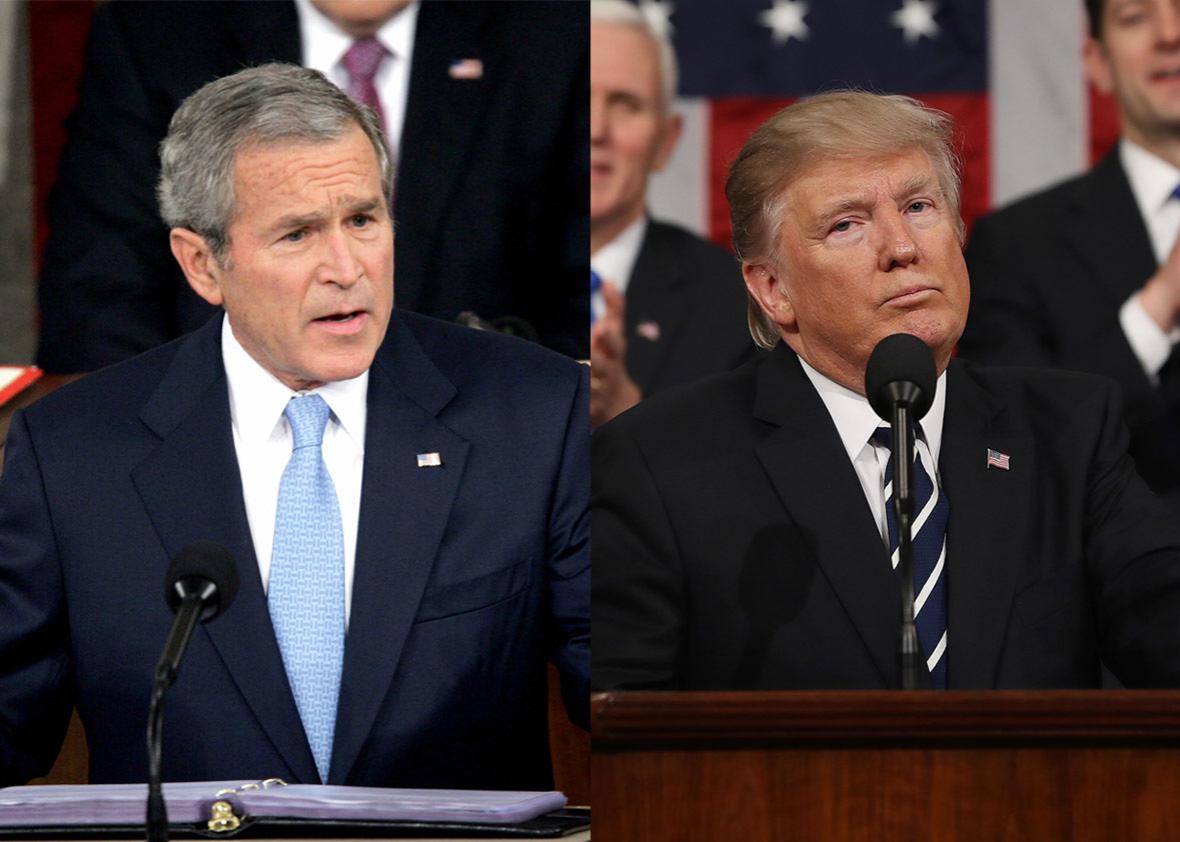President Trump won praise for his speech to Congress on Tuesday night. “Trump Offers Up a More Hopeful Vision,” said the New York Times. “Surprisingly presidential,” said the Washington Post. CNN’s poll gave him a thumbs-up: “7-in-10 speech-watchers say Trump boosted optimism.” Few seem bothered by what the speech lacked: traditional invocations of altruism, self-restraint, or any other principle. This was an appeal to ruthless tribalism. It’s who Trump is. It’s what we, in applauding him, are becoming.
Trump is so relentlessly amoral that it’s easy to forget what used to count as presidential. One useful measuring stick is the previous Republican president, George W. Bush. You can fault Bush for many things, and I have. But Bush accepted modern ethics. He believed in universal worth, human rights, and a concept of justice that transcended civil law. Trump shares none of these beliefs.
“America has never been united by blood or birth or soil,” Bush declared in his 2001 inaugural address. “We are bound by ideals that move us beyond our backgrounds, lift us above our interests and teach us what it means to be citizens. Every child must be taught these principles. Every citizen must uphold them. And every immigrant, by embracing these ideals, makes our country more, not less, American.” In his first speech to Congress—delivered almost exactly 16 years ago on Feb. 27, 2001—Bush told Americans: “We all came here for a reason. … Juntos podemos. Together, we can.” He called on Congress to make America not just wealthy, but “generous and just.”
As president, Bush failed to fulfill those aspirations. But Trump doesn’t even acknowledge them: In his remarks Tuesday night, Trump spoke not of generosity, justice, or ideals but of blood, birth, background, and soil. “We are one people, with one destiny,” he proclaimed. “We all bleed the same blood. We all salute the same great American flag.” A fascist leader could have uttered the same words. In place of Bush’s plea to welcome immigrants, Trump said refugees should “return home.”
Trump depicted immigrants as thugs. Repeating a tactic he has previously used against blacks and Mexicans—singling them out for criminal suspicion—he announced a new office dedicated to “Victims of Immigration Crime Engagement.” Tossing aside the distinction between legal and illegal entry, he falsely charged that legal immigration was sapping our wealth. He called for a “merit-based” policy that would admit only those who prove up front that they can “support themselves financially.”
To Bush, crime was more than an issue of law and order. It was a matter of criminal and social justice. In his February 2001 speech to Congress, Bush proposed a “compassion capital fund” to aid “children with a parent in prison.” He also criticized racial profiling by police. “When the law points a finger of suspicion at groups, instead of individuals,” said Bush, “too many of our citizens have cause to doubt our nation’s justice.”
Sixteen years later, speaking in the same chamber, Trump said nothing about racial profiling or the children of inmates. To him, the only moral standard is whether you wear a badge. “We must work with, not against—not against—the men and women of law enforcement,” said Trump. Unlike Bush, who argued that “stopping the abuses of a few” bad officers would boost confidence in police, Trump condemned criticism of law enforcement as a “wedge of disunity.”
The coldest part of Trump’s speech was his foreign policy. Every recent Republican president has espoused military, diplomatic, and trade policies based on the idea of freedom. “We will work with our allies and friends to be a force for good and a champion of freedom,” Bush pledged in February 2001. “We will work for free markets, free trade, and freedom from oppression. Nations making progress toward freedom will find America is their friend.” Bush distinguished freedom from power or self-interest: “The cause of freedom rests on more than our ability to defend ourselves and our allies.”
To Trump, there is only self-interest. In an overture to Russia and other human rights violators, he offered to cut deals: “America is willing to find new friends, and to forge new partnerships, where shared interests align.” Trump conceded that “free nations are the best vehicle for expressing the will of the people.” But in his next breath, he dismissed that concern: “My job is not to represent the world. My job is to represent the United States of America.”
In Trump’s calculus, foreign policy, like immigration, is a business. Plunder, torture, targeting civilians: Everything is on the table. Our troops don’t have to serve a larger cause or obey international law. “They only have to win,” he said. Nor do our partners have to respect human rights. They just have to “meet their financial obligations,” Trump explained. “And now, based on our very strong and frank discussions, they are beginning to do just that. In fact, I can tell you, the money is pouring in. Very nice.”
Bush urged lawmakers to be “good stewards” by protecting the environment. Trump advocated pipelines and coal mines. Bush called for teaching children “right from wrong.” Trump spoke only of advancement and jobs. Bush said leaders should serve their consciences. Trump said they should serve commerce. Bush proposed, “Much has been given to us, and much is expected.” Trump said we should “expect our partners” to give more.
Trump’s hollowness is self-defeating. By walling off channels between America and the world—aid, trade, immigration—he would rob our country of its distinctness. He would destroy, not protect, our national identity. “Those given the high honor of admission to the United States should support this country and love its people and its values,” Trump declared. If only he understood what those values are.
